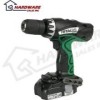Hitachi DV18DCL Instruction Manual - Page 16
screw at HIGH high speed, a screw may damage
 |
UPC - 717709013025
View all Hitachi DV18DCL manuals
Add to My Manuals
Save this manual to your list of manuals |
Page 16 highlights
English 6. How to select tightening torque and rotational speed Table 5 Use Machine screw Driving Wood screw Brick Clutch dial Position 1 - 22 1 - Rotating speed selection (Position of the shift knob) LOW (Low speed) HIGH (High speed) For 1/4" (6 mm) or For 1/4" (6 mm) or smaller diameter screws. smaller diameter screws. For 1/4" (6 mm) or smaller nomi nal diameter screws. For 5/32" (3.8 mm) or smaller nominal diameter screws. For 1/2" (13 mm) or smaller diameters. For 21/64" (8 mm) or smaller diameters. (DV14DCL/DV14DVC) For 13/32" (10 mm) or smaller diameters. (DV18DCL/DV18DVC) Drilling Wood Metal For 1-1/4" (32 mm) or smaller diameters. (DV14DCL/DV14DVC) For 1-1/2" (38 mm) or smaller diameters. (DV18DCL/DV18DVC) For drilling with a metal working drill bit. For 21/64" (18 mm) or smaller diameters. (DV14DCL/DV14DVC) For 7/8" (22 mm) or smaller diameters. (DV18DCL/DV18DVC) CAUTION: ● The selection examples shown in Table 5 should be considered as general standard. As different types of tightening screws and different materials to be tightened are used in actual works proper adjustments are naturally necessary. ● When using the hammer drill with a machine screw at HIGH (high speed), a screw may damage or a bit may loose due to the tightning torque is too strong. Use the hammer drill at LOW (low speed) when using a machine screw. NOTE: The use of the battery BCL1415, BCL1430, BCL1815 and EBM1830 in a cold condition (below 0 degree Centigrade) can sometimes result in the weakened tightening torque and reduced amount of work. This, however, is a temporary phenomenon, and returns to normal when the battery warms up. 7. Mounting and dismounting of the bit (1) After inserting a driver bit, etc. into the keyless drill chuck, firmly grasp the ring and tighten the sleeve by turning it toward the right (in the clockwise direction as viewed from the front) (See Fig. 10). If the sleeve becomes loose during operation, tighten it further. The tightening force becomes stronger when the sleeve is tightened additionally. (2) Dismounting the bit Firmly grasp the ring and loosen the sleeve by turning it toward the left (in the counter-clockwise direction as viewed from the front). Tighten Loose Ring Sleeve Fig. 10 16















